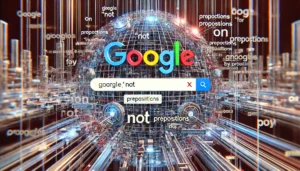The Notable Impact of AI on SEO
With Artificial Intelligence (AI) at the epicenter of this transformation. AI’s integration into Search Engine Optimization (SEO) strategies is not just a trend but a revolution, reshaping how we optimize websites, content, and user experiences for search engines. This article delves into the significant impacts of AI on SEO, highlighting how businesses and SEO professionals can navigate this new terrain to achieve unprecedented success in their online visibility and engagement.
Enhanced Search Algorithms
AI advancements have enabled search engines like Google to develop a more nuanced understanding of user intent behind search queries. This evolution means that SEO strategies must now prioritize topic clusters and semantic search optimization over traditional keyword stuffing. AI’s deep learning capabilities analyze the context and the relationship between words in search queries, pushing SEO professionals to focus on creating content that answers questions and solves problems, rather than merely including specific keywords.
- Understanding User Intent: AI has significantly improved search engines’ ability to understand user intent, moving beyond keywords to the semantics of search queries.
- Personalized Search Results: AI algorithms now personalize search results based on a user’s search history, location, and behavior, making SEO strategies more dynamic and user-focused.
AI personalizes search results for each user based on their past search history, location, device, and even the time of day, making search results more relevant and increasing the complexity of SEO strategies. This personalization demands that SEO efforts are diversified and tailored to various user intents and profiles, emphasizing the need for a more dynamic SEO approach that accounts for these individualized user experiences.
Content Optimization and Creation
Tools powered by AI, such as GPT (Generative Pre-trained Transformer) models, are revolutionizing content creation and optimization. These tools help generate content ideas, produce drafts, and even optimize content for SEO by suggesting keywords, readability improvements, and content structure enhancements. This shift allows content creators to focus on creativity and strategy, relying on AI to ensure their content is optimized for search engines and user engagement.
AI’s ability to process and analyze vast amounts of data at scale means it can identify patterns and preferences in content that resonates with users. This insight guides SEO and content strategies to focus on creating high-quality, relevant content. By understanding what content performs well—for instance, through AI-powered content analysis tools—marketers can tailor their content to meet user needs more effectively, improving engagement and SEO rankings.
- AI-driven Content Tools: AI tools aid in creating optimized content that resonates with both search engines and users, ensuring relevance and engagement.
- Content Relevance and Quality: AI’s ability to analyze large datasets helps in understanding what type of content performs well, guiding SEO professionals in creating more effective and targeted content strategies.
User Experience and Website Optimization
AI technologies such as chatbots and personalized recommendation engines enhance user engagement by providing timely, relevant, and personalized interactions. These AI-driven features can significantly improve user experience on websites, leading to longer visit durations, lower bounce rates, and higher conversion rates—all positive signals to search engines that can boost SEO rankings.
- Improved User Engagement: AI technologies like chatbots and personalized recommendations enhance user engagement, directly influencing SEO rankings through better user signals.
- Site Performance Analysis: AI tools can predict and analyze site performance issues, helping webmasters to optimize site speed, mobile-friendliness, and overall user experience, which are crucial factors for SEO.
AI tools can preemptively identify and diagnose site performance issues, from slow page load times to poor mobile responsiveness. By leveraging AI for website optimization, webmasters can ensure their sites meet the technical SEO standards required by search engines, thereby improving their visibility and user experience. AI’s predictive capabilities can also help in anticipating user behavior and adjusting the website accordingly to meet future demands.
Voice Search and Conversational AI
With the increasing use of voice-activated devices and virtual assistants, optimizing for voice search is becoming crucial. AI has made these devices smarter, understanding and processing natural language queries more effectively. SEO strategies must now include long-tail keywords, conversational phrases, and question-based content to align with the more natural language used in voice searches.
- Rise of Voice Search: With the proliferation of AI-powered virtual assistants, optimizing for voice search has become a critical component of SEO strategies, focusing on natural language and question-based queries.
- Conversational AI’s Role: AI enhances the ability to engage users through conversational interfaces, requiring SEO to adapt to more natural, conversational content that aligns with spoken queries.
Conversational AI, through chatbots or virtual assistants, is changing the way users interact with websites. This shift requires an adaptation in SEO strategies to prioritize content that answers direct questions and provides immediate value. Incorporating conversational AI into websites not only enhances user experience but also signals to search engines that a website is a valuable resource, further influencing SEO rankings positively.
Conclusion:
The intersection of AI and SEO is paving the way for a more intuitive, personalized, and efficient search experience. As AI continues to evolve, staying abreast of these changes and understanding how to leverage AI technologies will be paramount for SEO success. By embracing AI-driven insights and tools, SEO professionals can uncover new opportunities, enhance website performance, and craft content strategies that truly resonate with their audience. The future of SEO is here, and it is intrinsically linked with the advancements in artificial intelligence, signaling a new era of digital marketing where technology and human insight converge to create unparalleled user experiences








